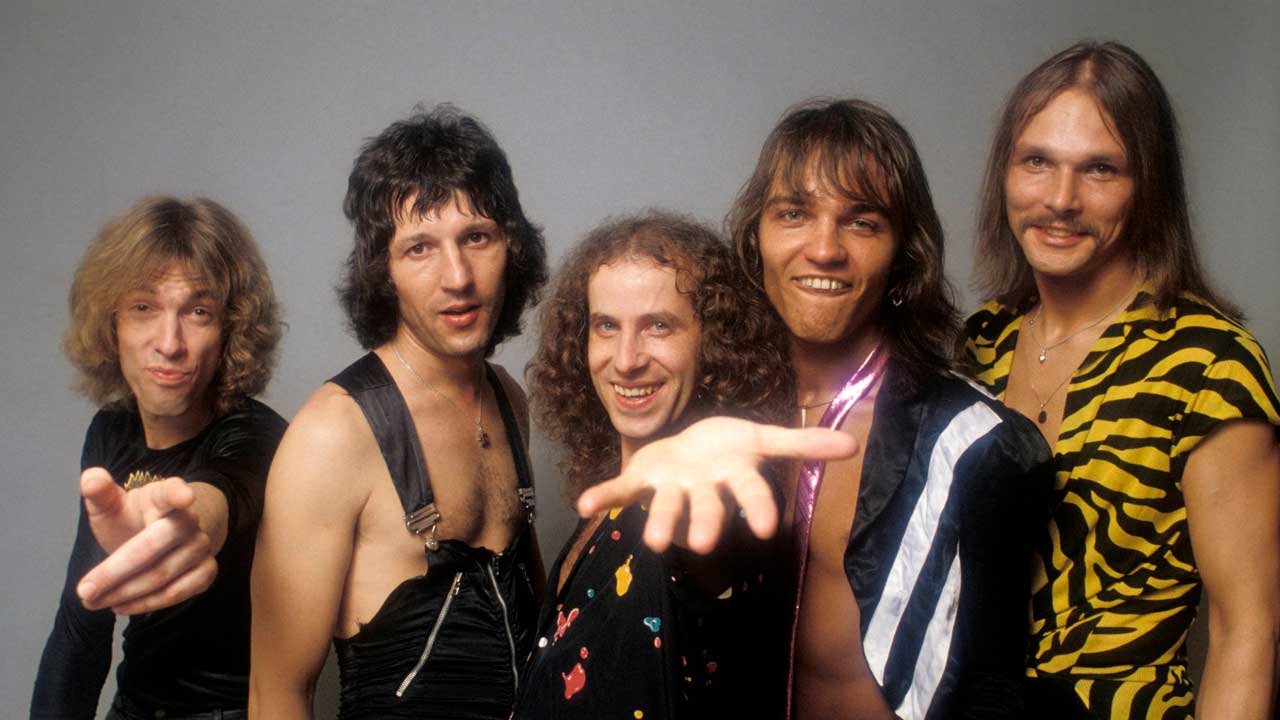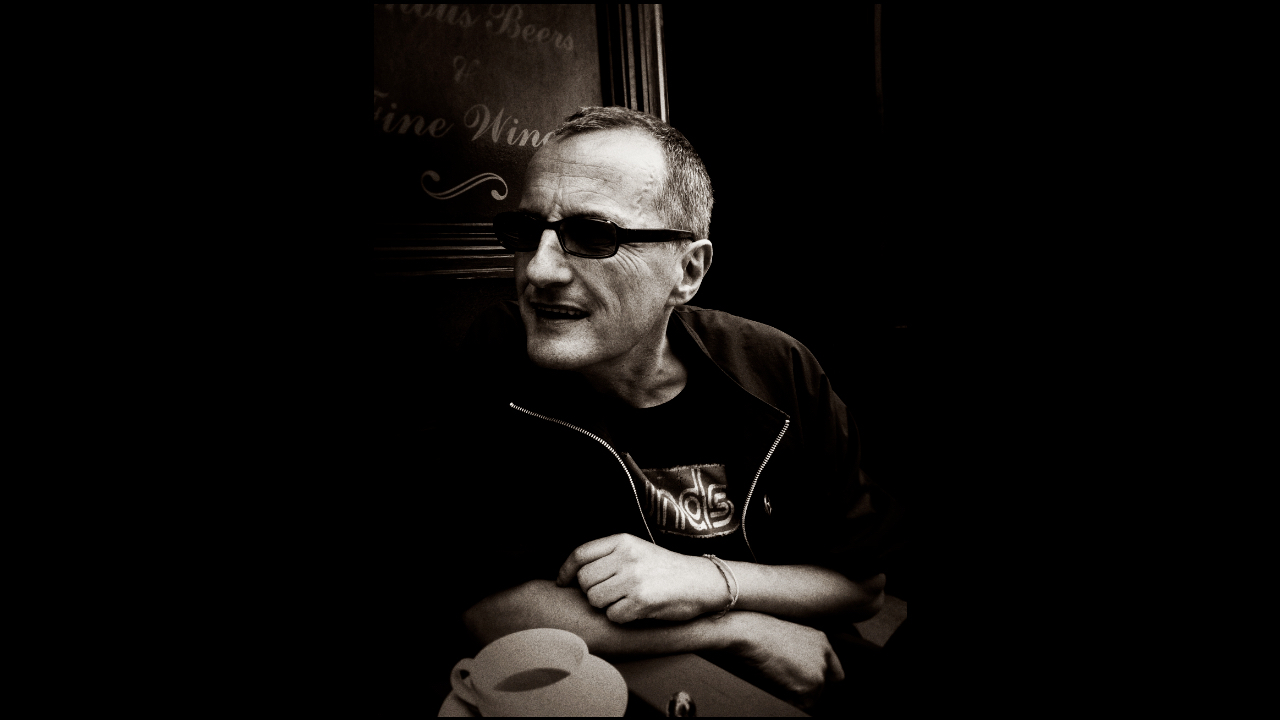In 2007 German rock legends the Scorpions released their 16th album. After several misfires, Humanity - Hour 1 was an album that found the band returning to the sound that made them superstars in the 80s and 90s. It was a good time for the Scorpions to tell their story... and what a story it turned out to be.
The year is 1972. The place is Cologne, Germany. The Scorpions are in the recording studio, about to lay down their debut album, Lonesome Crow, with producer Conny Plank. But first they have an important decision to make. Do they remain the Scorpions (that’s ‘the’ all in small letters to be accurate and pedantic), a name that came with founder member, songwriter and guitarist Rudolf Schenker from a band he formed in 1965? Or do they go for a new moniker and image to celebrate the new line-up and a fresh start?
Conny, already well known for creating the krautrock sound – having worked with the likes of Kraftwerk, Cluster and Neu! – has some definite ideas about their image and direction.
“We knew if we wanted to change something we’d better do it now,” recalls vocalist Klaus Meine. “Scorpions we thought was alright, but there were names like Led Zeppelin and Jefferson Starship, and we thought our name sounded too simple. So Conny said: ‘Let’s find something more aggressive – how about Stalingrad?’
“He wanted us to dress up in army uniforms and then storm on to the stage! I think he wanted to make us into an early Rammstein, with a theatrical show.”
Meine pauses and raises his eyes as if in disbelief that this event actually ever happened. “So we stuck to our original name. And, looking back, I think it was the right decision.”

Thirty-five years later and the Scorpions are still rocking like a hurricane in a ruthless business that saw off punk in the 70s, shot down hairspray rock in the 80s and annihilated grunge in the 90s. They have survived the current music industry meltdown by being one of the hardest-working live bands on the circuit, consistently conquering new, uncharted markets which so far this year include Mongolia and China.
While other equally established groups have gone into panic mode and taken the easier route of producing lamentable covers albums or touring a greatest hits show (or even doing both) the Scorpions have invested their own money and time into the production of a new album. Humanity – Hour 1 was made under the guidance of über producer/songwriter Desmond Child and is an effort to re-establish their rock credentials.
This, coupled with a recent appearance at the Wacken Festival which reunited them with most of their former members in a spectacular three-and-a-half-hour show, marks a return to form for the band. A band who had been abandoned by their more hard-core following for producing some execrable rock ballads – the main offender being Wind Of Change with its lamentable Roger Whittaker-esque whistling.
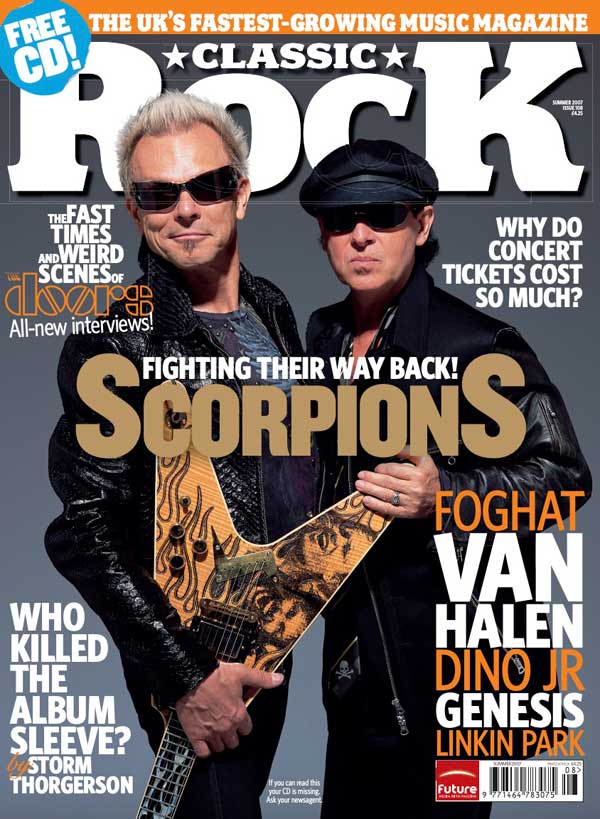
But more of that later. First I have to admit that the mighty Scorps had fallen off my musical radar for about 24 years. The last time we met was during the recording of Blackout which, along with albums such as Lovedrive, Animal Magnetism and Love At First Sting, proved to be a healthy antidote to the shambolic village hall buffoonery going under the guise of the New Wave Of British Heavy Metal. The Scorpions’ professionalism, wide-eyed enthusiasm and endearingly basic grasp of the English language made them a joy to behold.
But as the decades passed they became a distant memory, consigned to the bargain bin of musical history. Until 2006, that is, when they made a spectacular comeback at a Royal Albert Hall memorial for rock DJ Tommy Vance, with a tight, polished show that made headliners Judas Priest look positively Jurassic. As my jaw hit the floor, the band proceeded to assault an initially wary audience of classic rock dilettantes with a tight, well-thought-out set of their musical highlights.
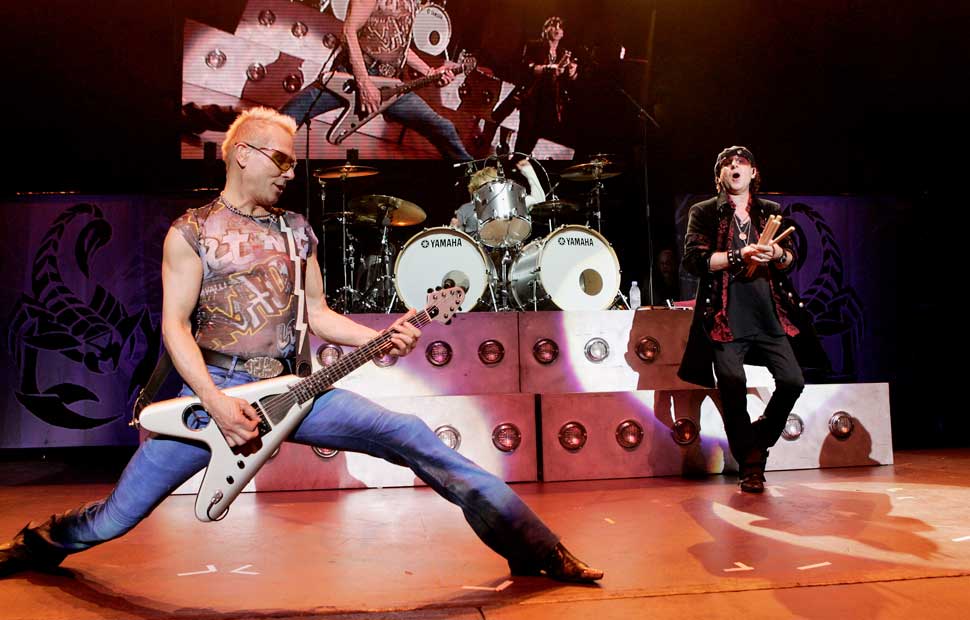
“I am glad that you mentioned the Albert Hall,” Klaus says. “When you have a long career and you are a powerful and energetic band, if you can’t deliver on the same level again, it’s very hard to continue. We feel that we can deliver as a live band, and we also want to deliver as recording artists.”
The Scorpions’ long, diverse history has taken them from being underground German metal merchants to the internationally established artists they are today.
Classic Rock caught up with the band in Paris in spring 2007, where they were playing one of a series of shows featuring original guitarist Uli Roth, a move inspired by the success of the reunion at Wacken. On the British dates in July Rudolf’s errant sibling, Michael, would also join them.
Today’s band is the same line-up that made the victorious return at the Albert Hall, featuring the long-standing triumvirate of Rudolf, Klaus and guitarist Matthias Jabs, plus relative newcomers, Pawel ‘Baby’ Maciwoda (bass) and James Kottak (drums). I spoke to the original members over a couple of days to get an overview of their career, the highs and lows, and also to talk about the new album, tour and their attempt to re-establish themselves.
The first thing that becomes apparent is that Matthias is not too happy about featuring ex-guitarists on the current tour. “Here we are in Paris, on the day the new album is coming out, and we’re playing a show featuring members from the past playing old songs,” he grumbles. “Fans do not come for a history lesson. Don’t get me wrong, Wacken was a great idea and very enjoyable experience, but we’ve invested a lot in making Humanity – Hour 1 and it’s important that we push it.”
So why do it? “Because certain people are reacting to requests on the internet. When 50 people mail you asking for old members to come back, it seems like a lot. In reality it isn’t, it’s just a bunch of die-hard fans scattered across the globe.”
Meine is not of the same opinion. “For the fans it’s very important that we go back in our history and even play songs from the 70s, which sometimes even we feel is a long time back,” he explains. “And having Matthias in the band as lead guitar player, of course he’s not very much interested in playing songs by Uli. That was way before his time and you’ve got to respect that. But the fans appreciate that the Scorpions are still rocking like crazy. I think it gives us a lot of street credibility.”
Adding to the intrigue, later in the evening Uli Roth reveals that he was actually asked to play on the new album but couldn’t fit it into his schedule. Aside from this minor quibble, the band appear to be a solid, functioning unit, and they still look and sound incredibly healthy and optimistic. While Meine and Jabs disguise their follicle erosion with designer headgear, Schenker has replaced his uniform centre-parted bob with tufts of bleached hair gelled in a style that makes him look like a Bavarian elder counterpart to David Beckham.
To cover the Scorpions’ whole history in the confines of one article is an impossible task as it spans over 40 years, countless albums and line-up changes, along with every rock’n’roll soap opera scenario imaginable. But there are pivotal points and events that stand out. Firstly it’s important to understand the musical landscape of the band’s home town of Hanover in the early 70s. While the UK music press focused on the experimental electronica of groups like Tangerine Dream and Can, there was also a burgeoning hard rock scene in Germany.
“Hanover was well known all over Germany as a heavy metal town,” reveals Meine. “I was in a band called Copernicus with Michael Schenker. We used to do covers of songs by bands like Taste and Led Zeppelin. We would compete with the Scorpions, as we played the same venues. It was all about who had the biggest PA and got the best reaction. At that time Rudolf used to sing in the Scorpions, with his back to the audience.”
Matthias, who is almost ten years younger than his sparring partners, remembers both bands during his early tenures with German groups Lady and Fargo.
“We used to pass each other on the autobhan. In those days we all had our band names plastered on the side of the van to stop them getting stolen.”
Eventually Rudolf convinced both Michael and Klaus to join the band and record Lonesome Crow. This was a false start as they promptly lost the prodigious Michael to the clutches of UFO. They immediately went to Uli, who had turned them down before.
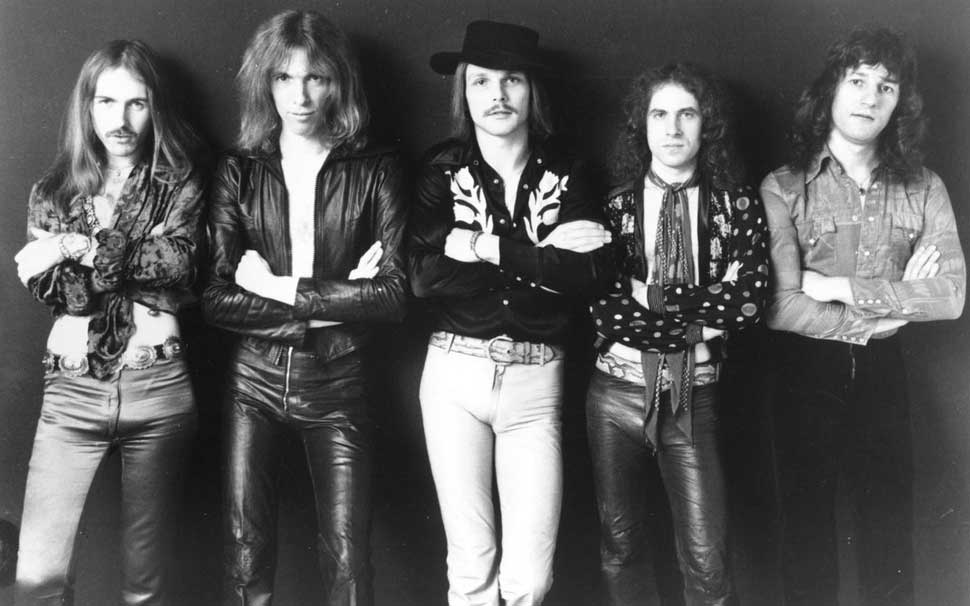
“I knew the Scorpions back in 1970 when they were virtually a rhythm’n’blues band,” recalls Uli, an amiable chap whose gentle manner matches his 60s retro-hippy finery. “When they first asked me to join, I declined. I had a band called Dawn Road which was an amateur thing, we were doing Emerson, Lake & Palmer stuff and still at high school. I was doing mainly classical music and that wasn’t my direction.”
After much cajoling from Rudy (Schenker’s persuasive skills are a theme prevalent throughout the band’s history), Uli agreed to fill in on one live performance. Shortly after the group disbanded.
During this hiatus Rudy spent a lot of time with Dawn Road. “I guess he liked what he heard or saw and we started to play together,” remembers Uli. “And then we got Klaus back in again. Even though there were more members of Dawn Road than the Scorpions, we decided to change the band’s name to the Scorpions because they already had a record deal.” The band also included bassist Francis Buccholz who would become an integral member but eventually split in acrimonious circumstances.
The Scorpions recorded Fly To The Rainbow in 1974 and proceeded to tour extensively, although even then it was obvious that Schenker and Meine were on a different path to Roth. “Rudolf and Klaus are a great song-writing team, one of the best ever,” Uli says. “I wrote the other half of the stuff, which was a bit more rock’n’roll. It was a strange mix but it worked.”
In Trance followed and then the band released the notorious Virgin Killer, featuring a suspiciously young, pre-pubescent girl posing in a provocative manner on the cover. The record was the first in a series of controversial Scorpions album sleeves that would gain the band notoriety and publicity all over the world. Although they point out that the picture on Virgin Killer was not their idea and it’s something they would baulk at doing today, it didn’t do their profile any damage.
“With Virgin Killer, the record company guy said: ‘I want to do this and I don’t care if they put me in prison for it!’” Meine recalls. “I remember we walked home with the completed artwork and I was thinking this is definitely an album you don’t want to show back home.” But he adds: “I admit later on we used covers like weapons of provocation. People would talk about them and we loved doing them, especially with Storm from Hipgnosis. We followed his work from Pink Floyd and Led Zeppelin – they were our heroes.”
Two significant things happened between the recording of In Trance and Virgin Killer. Producer Dieter Dierks came on board and over the years became responsible for moulding the band’s sound to such an extent that he was regarded as the sixth Scorpion (in fact, it turns out that Dierks was second choice to Chas Chandler). It was also becoming apparent to Uli Roth that he no longer wanted to play in a hard-touring rock outfit even though the Scorpions were by now making waves all over Europe and Japan.
“Each album got bigger and bigger and the Tokyo Tapes live album was an international breakthrough, but I had really mentally left the band some time before that,” says Roth. “I wanted to go a more experimental route. I wanted to be a little freer in music, rather than just watch album sales. It was a foregone conclusion that I needed to split but it took a year. I told them to look for a guitarist but they never did.”
Both Michael and Uli, although extremely talented players, seemed too self-indulgent to be a part of the vision that Rudolf and Klaus had for the band.
“They had very big egos, that’s for sure,” Klaus agrees. “They both had their own vision of what they wanted to do and they were definitely not team players. Now the focus was much more on the songwriting of Rudolf and myself. The band was becoming more focused on the artistic direction.”
Geographically, the direction they were headed in was the States. But before that, they needed to establish a solid line-up. With Uli about to depart, they had another setback when drummer Rudy Lenners left due to ill health. However, this turned out to be a blessing in disguise. In a strange turn of events they went to Britain to look for a replacement, only to find a German, Herman Rarebell, who was a regular customer at a legendary London watering hole known as The Speakeasy.
Rarebell had left Germany for Britain when he turned 21 in order to expand his CV and get some studio work. While in the UK he bumped into Michael Schenker, who suggested he go and check out his brother Rudolf’s band. This led to a successful audition, and Rarebell was soon heading back to Germany. Herman was a charismatic and energetic character, and immediately got involved in the songwriting process, penning the lyrics to He’s A Woman, She’s A Man (based on a true-life experience in the Parisian red light district) on his first Scorpions album, Taken By Force.
As the years passed Herman would become the one who wrote some of the Scorpions’ most popular songs. He explains: “The reason for this was that my English was the best and Dieter liked my words. I wrote about what happened to us while we were out on the road. And I think people can associate with that.”
Klaus admits that it took him a while to feel comfortable singing in English, even though he had done so throughout his career. “It was very difficult at first but German lyrics just didn’t fit in with the music and we wanted to go all over the world. Growing up in postwar Germany, to be a German was nothing to be proud of [laughs]. We wanted to be respected in an international community of musicians.”
Taken By Force was Uli’s swansong and the band set out on the arduous task of auditioning over 150 guitarists. They finally settled on a former member of the Pretty Things, Peter Tolson. Unfortunately, things didn’t gel and they again found themselves axeless. Once more they found the solution closer to home, in the form of Matthias Jabs.
“Rudy rang me up to say that he was recording a solo album and would I like to play on it, “Jabs recalls with amusement. “That was typical Rudy, finding a way to hook you in.”
But when Jabs joined the Scorpions, the unexpected happened. Michael Schenker had left UFO after an altercation with lead singer Phil Mogg and had also developed severe drug and alcohol problems in the process. An American management team expressed interest in working with the Scorpions, but strongly suggested it would be a good idea to take Michael on board, regardless of his state of mind. Desperate to break in the States, Rudy agreed and promptly let go of Matthias.
“What you have to remember,” Jabs explains, “is that the Scorpions weren’t a big band at all at the time, so it was really no big deal.”
Michael’s problems manifested themselves early on in the Scorpions’ US tour – he collapsed on stage during the third show. As the tour progressed the band had to plead with Matthias to help them out. “Rudy kept calling me to help out on the shows, and every time I said: ‘Okay, but just this one time.’ And he agreed… typical Rudy.”
Finally, an incoherent Michael departed and Jabs joined full-time, completing the classic Scorpions line-up. Michael did manage to stay long enough to contribute to a couple of tracks on the next album, Lovedrive, which marked the beginning of the band’s full-on assault of the US.
“I remember the first show we did in Cleveland,” says Rudy. “We were the opener and we were rocking like a hurricane already [laughs]. We were only allowed 30 minutes but we played 40. The management and the other bands were looking at each other saying: ‘What are these crazy Germans doing?’ I remember Ted Nugent coming down to the dressing room and saying: ‘Guys, you have to calm down!’ We finished the show before they managed to unplug us, and this was the beginning of the American success.”
With a more polished, tighter sound, the Scorpions’ formula of mixing heavy rock and power ballads was already in place. Lovedrive (with another controversial cover photographed in the back of Elton John’s Rolls-Royce) entered the Top 50 in the Billboard chart and soon after the band went back into the studio to record Animal Magnetism. It wasn’t as successful as its predecesser but the band continued to build a strong following on the road. However, Klaus began to experience problems with his throat. This became more noticeable when the band started work on their next album, Blackout.
“When we started working on arrangements Klaus’s voice sounded very unhealthy,” says Rudy, “then after about three or four weeks he couldn’t sing any more. When we got back to Germany he went to the doctor. The doctor looked at his vocal cords and said: ‘What is your job?’ When he said singer, the doctor said: ‘Klaus, you have to get another job!’”
Klaus recalls: “It would have been easy for the band to walk out and look for a new singer, but they didn’t. Rudolf kept pushing me and challenging me. He said: ‘Whatever it takes, we will wait for you.’”
With Don Dokken helping out on guide tracks, Klaus returned after a couple of operations to sing his herz (German for ‘heart’) out on easily the best Scorpions album ever.
Producing three hit singles, Blackout was the band’s most successful album to date, although Meine was wary of the inevitable tour.
“I had no idea if I would survive going on the road. My voice was untested. But after a year we came back loaded with platinum albums. This was the next level and in a way I was starting again.
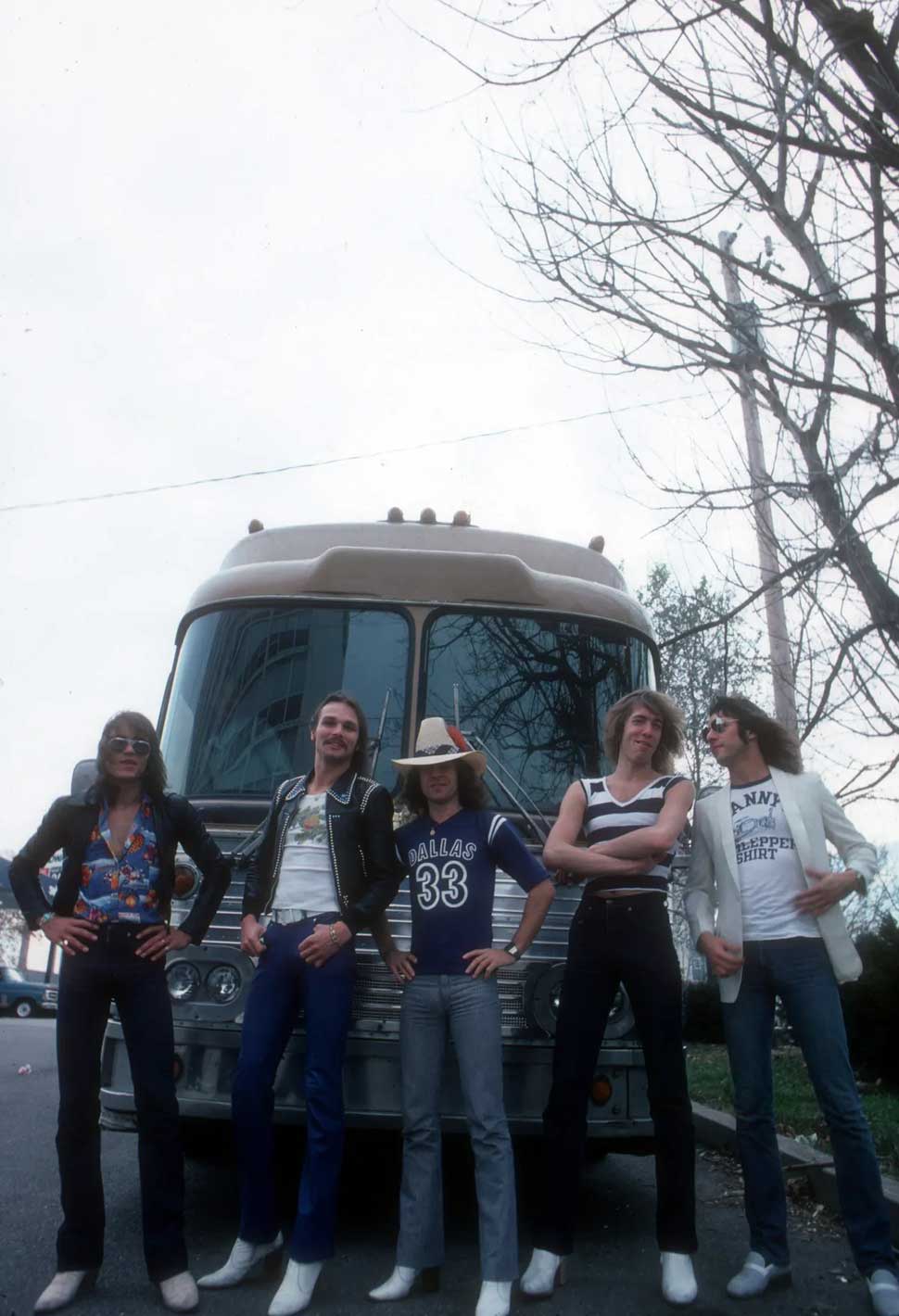
Two years later, in 1984, came Love At First Sting and its smash Rock You Like A Hurricane, which was propelled to mega-hit status by MTV.
A succession of successful albums and tours followed and as the 80s drew to a close the group found themselves coming to the end of their relationship with Dierks – much to their relief.
As Klaus explains; “We were not happy with Dieter. We were enjoying a lot of success and it was not our choice to keep going back to Cologne and record. Our desire was to go to places like the Record Plant in Los Angeles, but we couldn’t because we were tied up in contracts.
"Savage Amusement was our last album with Dieter and it was a difficult time for us. We had come to the end of our contract but there were still issues. What you have to remember is that when we signed up with him we were young kids. Looking back on it we just tired of each other and we had to split.”
Rudy: “The chemistry had gone because Dieter wanted to do an album like Mutt Lange, because of the success of Def Leppard. He wanted samples, programming… all that stuff. If you listen to Savage Amusement, it’s very sterile.”
Without Dierks at the controls, the band looked to an American producer for inspiration. Keith Olsen twiddled the knobs for Crazy World, which spawned one of the Scorpions’ greatest hits… their Stairway To Heaven… their Freebird… their albatross? It was Wind Of Change, of course. Inspired by the Scorpions’ performance at the 1989 Moscow Peace Festival, it came at a most fortuitous moment.
“It was the end of the 80s when we did Crazy World,” Klaus reflects. “We were on the edge facing a huge musical revolution with grunge and alternative music in the early 90s. Almost every act that came from where we did in the 80s got killed. If this album had been a flop, it could have easily been the end of us too. The success of Wind Of Change helped us survive… and it was on the first album we did without Dieter.”
Were they aware that the song – and Klaus’s whistling – alienated some of the Scorpions’ fans?
Rudy: “Wind Of Change was a big success because mothers liked it, grandmothers liked it and kids liked it. But a lot of rock fans said: ‘No, this is not my band anymore.’ But it helped us survive to make another album. I am a rocker but our ballads work because we have an outstanding singer and he can sing them well. It’s just become a part of us. I like Deep Purple because of Child In Time. Always when a rock band writes a ballad it’s something special. The problem is if the ballad on the album becomes too big… then there’s something wrong.”
Rudy and co continued to play festivals all over the world including Donington, Rock In Rio and a historic guest appearance in Roger Waters’ performance of The Wall in Berlin.
Unfortunately, the euphoric glow was shattered when the Scorpions found themselves in financial dispute with their business manager. This led to the departure of bassist Francis Buchholz, leaving them angry and dismayed.
“People often think our divorce from Dieter was ugly, but it wasn’t really,” says Klaus. “However, with Francis, it was a very ugly divorce. To cut a long story very short, when we made a decision to change our whole business structure and fire our business manager, unfortunately Francis went with him. We lost a friend and great musician.”
The wounds are still deep – as was revealed at Wacken, where Buchholz was the only Scorpions member noticeable by his absence. (Ironically, Buchholz is now bassist with the Uli Roth Band, who would support the Scorpions on their British summer 2007 dates.)
As the band ploughed their more commercial furrow, they had another loss when Herman Rarebell decided to leave in 1996, explaining that he was “sick of playing Wind Of Change for the millionth time and living on the road”.
Some die-hard fans will have you believe that with the departure of Rarebell, a larger-than-life figure, the Scorpions’ career took a downward trajectory, especially as the drummer wasn’t there to help out with the lyrics. In some ways this is true. Although they continued to deliver great live shows, on record they made some serious errors including 1999’s Eye II Eye, a misjudged stab at techno.
By 2007 the Scorpions had come full circle. They were again determined to crack the international market, and at its best their album Humanity – Hour 1 recalled Blackout’s glory days.
“You never know – this album may be our last one, who knows?” Klaus says. “You can’t take it for granted there will be another one. So when we do a record we want it to be great. We want to end on a high, to keep going and find a moment to have a nice way out of this madness. The best thing is that we have a good chemistry. And our friendship is still intact. Who else can you say that about after so many years?”
This article originally appeared in Classic Rock 108 (Summer 2007)
